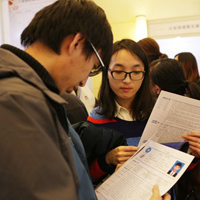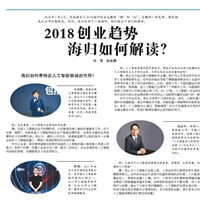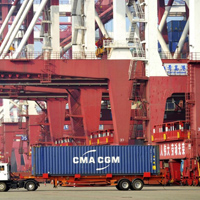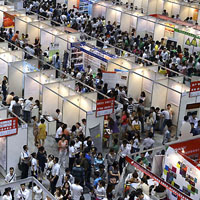-

【Global Times】Chinese cities dangle perks for young talent
Inland cities face brain drain, exodus of migrantsThe Chinese Service Center for Scholarly Exchange under the Ministry of Education holds a job fair, offering positions for over 3,000 returned overseas talents. Photo: ICCities across China are competing to attract young talent, promising large research grants and housing subsidies to those who can help drive innovation and economic upgrades.At least 16 second-tier cities, including Xi’an, Chengdu and Wuhan, have released preferential policies to attract talent from abroad and major Chinese cities such as Beijing and Shanghai.Foshan from South China’s Guangdong Province released a new document on Friday, promising to inject no less than 500 million yuan ($77.66 million) per year to attract talent.The city also promised to invest at least 250 million yuan per year to help boost scientific and technological innovation and vowed to give out cash bonuses of up to 4 million yuan to help each selected top-notch talent buy property.The document said the top talents are free to choose whichever school they like for their children and the city government will help arrange jobs for their spouses. "Foshan must be willing to invest in talent to gain an advantage in the region," said Huang Yongyao, deputy head of the organization department of the Communist Party of China’s Foshan committee, Nanfang Daily reported.Foshan is already late in the game of attracting talent.Xi’an from Northwest China’s Shaanxi Province in November 2017 established a special committee to attract talent, vowing to attract a million college graduates in the next five years to work and set up businesses in the city. To do so, the city promised to give a 20 percent discount on property prices and help resolve household registration issues. Wuhan from Central China’s Hubei Province announced it would build 3,605 apartments for college talent, and designated renowned entrepreneurs, such as Lei Jun, founder of Xiaomi, who graduated from Wuhan University, to help the city government achieve its goals. "In the 1980s and early 1990s regional governments were competing for investments to boost GDP, and now Chinese cities have shifted to the competition for talent," said Miao Lu, secretary general of the Center for China and Globalization(CCG), a Beijing-based think tank."It is possible that such competition may drain the talent pool in remote areas, but in general, it is a good thing to create competition among different regions. It will force local governments to improve their business environment and living conditions. As long as the competition is benign, it will help boost the overall competitiveness of our country," Miao said.Many inland Chinese cities are becoming less populated, fearing they would become ghost towns and lose their competitiveness. According to a paper in Scientia Geographica Sinica, more than 1.36 million people have emigrated out of Northeast China, casting a shadow on the region’s development.Priority shiftAnalysts said another reason behind the competition for talent is the aging population. They say the change has forced regional governments to speed up economic upgrades from labor-intensive to innovation-oriented industries, which requires more talent to form industry chains.Wen Xiaogang, a physics professor from MIT and a member of China’s Thousand Talents Program, said the rapid increase in research funds and salaries to international-level talent has increased China’s attractiveness to scientists."What China needs are young or middle-aged scientists, who can help with the country’s innovation," Wen told the Global Times."Many are at a stage of raising children, which made good schools a prerequisite for them to choose employers. China’s exam-oriented education could be one obstacle in attracting top-notch scientists," Wen said.From Global Times,2018-1-15
2018年1月18日 -

【人民日报海外版】2018创业趋势,海归如何解读?
2018年1月6日,本版推出了2018海归创业主题词“强”和“AI”。主题词一经发布,便在相关人士中引起热议。对此,我们采访了一些海归,他们给出了自己的看法。海归如何看待在人工智能领域的作用? 王卓然英国伦敦大学学院计算机专业博士,专注于人工智能语义识别领域十余年,曾领导开发了东芝第一套人机对话系统。现为三角兽(北京)科技有限公司CEO。问:在您看来,人工智能今后将会如何发展? 答:目前人工智能还处于初期阶段,大多数是在做人教给的重复性工作,还不足够“聪明”。但是我国人工智能领域正处于高速发展阶段,也具有丰富的应用场景和巨大的消费市场。我认为,最快10年左右,普通家庭都可以轻松购买一台集合型的人工智能机器人,帮助人类得到更好的生活环境。 作为从业者,我非常希望能见到我所创造的人工智能机器人能有被人类爱上的能力。到那个时候,机器人会成为与人类一般无二的存在,这应该是所有人工智能科学家的梦想,也需要更多人的共同努力。 印 奇2011年成立北京旷视科技有限公司,是中国人工智能领域代表性人物之一。2016年入选福布斯中国“30位30岁以下精英”榜单并位列企业科技领域榜榜首。问:人工智能将替代很多劳动力,那会不会由此出现大规模的失业潮?在急需人工智能专业人才的行业里,文科生是否也存在着机会呢? 答:我认为不会出现大规模的失业潮。我们可以反观当年汽车问世的时候,很多人也觉得将要失业。但汽车的诞生导致了需要雇佣更多的人去造汽车。技术的变革带来的是人类工作内容的转化。比如,客服工作,可能机器会比现在的人工客服人员更快、更准确,但人工智能产业带来了一种新的工作,叫数据标注员,原来的客服人员就可以平移去做这种工作。另一方面,人工智能一定会促进产业的升级,而行业的升级必定会提供更大的空间让人去做更加富有创造力的、高端的工作。 对于文科生而言,我认为有两个方面的机会。首先,以教机器人弹钢琴为例,理科生构建渠道,使这件事成为可能,而教机器人弹钢琴的则是那些懂艺术的文科生;其次,人工智能可以通过“智能推荐”的方式发掘更多优秀的作家、画家等,并通过算法分析,把他们推荐给喜欢这类风格的用户。 张本宇深耕人工智能领域19年,手握150项美国专利,创新工场AI工程院副院长王咏刚称其为“人工智能华人科学家中排名前 10 位大牛之一”。现为杭州云脑科技有限公司CEO问:人类对于人工智能的情感比较复杂,有期待,也有恐惧,你觉得应该怎样看待人工智能? 答:我认为人工智能只会是工具,人类会利用它做更多有价值的事情,所以不需要畏惧它。当年洋务运动引进西方机器和照相机的时候,人们极其恐慌,觉得机器会吃人、照相机会摄人心魄。如今,人类早已将机器制造得越来越先进,而机器也帮助人类做着越来越多的事。如照相机制造技术不断发展,而人也将照相机运用得炉火纯青,诞生了大批优秀的摄像师。人工智能的发展也是这样,人类同样可以利用它做出很多想都未必想得到的、史无前例的创新。我们有充分的理由期待——人工智能将带给我们更多的惊喜。海归如何看待“强”? 王辉耀国务院参事,中国与全球化智库(CCG)理事长兼主任、欧美同学会副会长。问:2017年海外学子归国潮涌,您认为相比过去,现在海归的实力是否变强?呈现出哪些不同的特点? 答:现在回国的海归更加年轻化,接触的现代科技更多,包括互联网、大数据、人工智能……随着国内相关行业的迅速发展,这批海归出国时不会像老一辈海归那样,对国外生活感受到那么大的差异。 很多老一辈海归是在国内工作多年后出国留学的,而新一代海归出国前大多没有在国内的工作经历。总的来说各有利弊。但新一代海归的学习能力和创新能力更强。问:现在,各地的引才政策频出“强”招,您认为哪些政策更能吸引海归?各地引才政策在未来应该如何改进? 答:政策的力度肯定起到一定作用,但是更重要的还是当地市场的吸引力、上下游产业链的完善程度、创业的便利程度。 对于引才政策的改进,我希望在未来能扩大政策的覆盖范围。目前很多政策只针对博士,今后可以逐渐扩大到本科学历的创业者。学历不应该是能否享受引才政策的决定因素。一些优秀的本科毕业生在国外获得了工作经验之后回国创业,同样很有竞争力。问:如今海外学子纷纷选择回国创业,留学“归国潮”势头强劲,您是如何看待海外学子归国浪潮的? 答:这么大规模的海归潮是中国所独特的现象,没有哪个国家有中国留学生这么大的一个群体,也没有哪个国家有专门针对留学归国人员的政策和机构。海归一定会成为中国创新创业的一股巨大的力量。 中国发展很快,2018年,在人工智能、大数据等新的领域,在传统的科教文卫领域,在非政府组织、公益机构,都将吸引大批海归。海归拥有前沿技术、国际视野和国内外的人际网络,能够充分利用国际大市场,这些优势也会助力海归发展。文章选自《人民日报海外版》,2018年1月13日
2018年1月18日 -
王通讯:抓住“人才资源”把握“人才学”新方向
王通讯,CCG学术委员会专家、中国人才研究会学术委员会主任 党的十九大报告提出,人才是实现民族振兴、赢得国际竞争主动的战略资源。“国外人才发展丛书”囊括了国外很多人才方面制度、政策和经验。这与出版社、全球化智库、研究会等各方面的努力是分不开的。新时代、新高度、新使命的人才研究工作需要做到以下三点: 第一,要学习外国研究人才的经验。美国大量研究人才的问题,我们需要学习、了解美国如何看待人才研究、人才学术。美国哈佛大学出版机构出版了一本名为《超越人力资源管理》的书,介绍了一个新的学科--“人才学”,是美国两位教授约翰·W.布德罗和彼得·M.拉姆斯特德的合著。该书首创人才学,将人才管理人事管理进化而来的人力资源向更具科学性和学科性的方向推进,并把它作为决策科学。人才学意味着人力资源管理从专业做法上向决策科学范式上的扩张,书中认为人才学在美国是决策科学。如今,人才已经形成了系统的学科---人才学。人才学着眼于决策改善,人力资源管理着眼于服务的提供,而人才学的主轴是人力资本、桥梁、决策框架。 第二,人才战略即人才竞争战略,现在出现一个新动态,被称为“人才生态战略”,除此之外,还有“人才生态发展”,我们不仅需要高层次、高精尖人才,还要有生态意识,生态理念,生态思想,所以要加强人才生态学的研究。 第三,要把人才作为战略资源来看待。美国作家写过一本书叫《回形针行动》,首度披露大量机密信息,揭开“二战”后期美国大举招揽纳粹科学家的黑暗内幕。“二战”后期的混乱岁月中,美国面临诸多艰难抉择,包括如何处理纳粹德国的科学家,他们正是昔日纳粹无坚不摧的战争武器背后的智囊团。一项长达数十年、旨在将希特勒麾下1600 多名科学家转移至美国的秘密计划就此展开,这就是“回形针行动”。这些科学家大多被指控犯有战争罪,为美国效力后却在火箭技术、医疗以及太空科技领域取得令人尖叫的巨大成就。由此可见,人才问题是非常复杂的,传统理论、说教、道德来解释往往不行,只能从战略问题高度的角度上来解决。十九大提出人才是战略资源,只有充分理解人才是战略资源这个概念,才能做好人才工作。 (作者系CCG学术委员会专家、中国人才研究会学术委员会主任王通讯,本文根据CCG “中国人才50人论坛”暨国外人才发展丛书圆桌研讨会发言整理)“国外人才发展丛书”系列 ▶ 《国际人才竞争战略》王辉耀著 ▶ 《国外人才能力标准与评价》方振邦著 ▶ 《国外高技能人才战略》吴道槐、王晓君著 ▶ 《发达国家人才流动与配置》戴长征著 ▶ 《加拿大人才发展战略》陈振明、陈芳著 ▶ 《全球创新政策指数报告(2012)》(美)罗伯特·阿特金森、史蒂芬·埃泽尔、卢克·斯图尔特著 杨耀武、郭华、魏喜武等编译 ▶ 《新加坡人才战略与实践》刘宏、王辉耀著 ▶ 《国外引才政策研究》冯凌著 ▶ 《技术移民制度比较》柳学智、熊缨等著 ▶ 《公共人事管理:欧盟七国实践比较研究》(芬兰)孟竹安著 杨耀武、郭华等译 ▶ 《美国全球人力资源战略的历史演变与启示:构建面向世界的中国21世纪人才战略》郭玉贵著 ▶ 《德国人才战略:历史、发展与政策》陈凌、张原、国懿著 ▶ 《美英科研诚信建设的实践与探索》刘军仪著 ▶ 《博士后制度的国际比较》刘宝存、袁利平著 ▶ 《世界主要国家(地区)工程师制度》黄梅等编著 ▶ 《中美留学制度比较》柳学智著 ▶ 《英国人才制度与人才发展战略》蓝志勇、刘洋著 ▶ 《国外人才培养与开发》刘宝存、钟祖荣、刘强著【历届中国人才50人论坛回顾】第四届中国人才50人论坛第三届中国人才50人论坛第二届中国人才50人论坛第一届中国人才50人论坛
2018年1月17日 -

【彭博】作别美国梦,硅谷精英“回流”中国蔚然成风
几年前,王翌心里装着美国梦。他刚刚从普林斯顿大学毕业,在谷歌找了一份工作,並在硅谷买了一套大公寓。2011年的某一天,他让妻子坐到餐桌旁,告诉她自己想回中国。他对于担任这家搜索巨头的产品经理已经厌倦了,渴望回到家乡创办自己的公司。不过,要说服妻子放弃温和宜人的加州回到雾霾笼罩的上海,并不是一件容易的事。“我们刚刚发现她怀孕了,”现年37岁的王翌回忆起那些在公寓里来回踱步的日子时说道。“决定作出前那几周的日子非常难熬,但最终她明白过来了。”王翌王翌的行动取得了回报:其广受欢迎的英语教学应用流利说去年7月筹集资金1亿美元。越来越多像王翌这样的硅谷精英憧憬着光明的事业前途而回到中国。这个空前趋势让Facebook Inc.、谷歌等硅谷的中坚企业日益感到不安。在中国企业谋求全球扩张,中国力争主导人工智能和机器学习等下一代技术之际,受过美国教育的中国人才正在成为关键的推动力量。中国留学生曾经对海外工作机会和外国国籍梦寐以求,如今许多人则更加看好国内的职业机会。如今,中国拥有大量的风险资本,政府出台了各种金融激励措施鼓励开展尖端研究。“人才的流动越来越明显,因为中国的创新势头确实正在变得更加强劲,”史宾沙公司猎头祁瑞峰说。“这只是开始。”曾在国外工作或学习、回国时间足够长的中国人有一个专门的称呼——“海龟”。曾几何时,能在一家美国科技巨头任职可以说是一件了不起的事情,但现如今,腾讯、今日头条等本土公司也享有崇高的地位。在中国以外鲜为人知的搜索巨头百度将前微软杰出人物陆奇纳入麾下,负责百度人工智能事业,陆奇也成为近年来最受瞩目的归国人士之一。陆奇阿里巴巴集团的盛装亮相是一个催化剂。这家电商巨头2014年进行了全球最大的首次公开募股(IPO)——其纪录迄今无人打破。阿里巴巴和腾讯目前已位列全球前十大市值公司之列,与亚马逊和Facebook比肩。中国的风险投资堪与美国媲美:全球估值最高的5家初创企业中有三家总部设在北京,不是加州。与此同时,特朗普政府仍在美国一意推行限制移民的政策,抵制海外留学生和外国人就业。根据全球化智库(CCG)以及智联招聘2017年对1,821人的调查,科技已经取代金融成为吸引海外归国华人最多的领域,占所有回国人员的15.5%,高于2015年上次调查的10%。2016年海外(主要是美国)归国留学生人数比2013年激增22%,达到432,500人。也不是所有人都放弃硅谷。根据领英2017年的报告,全美AI工程师超过85万,其中7.9%是中国人。这里面自然还包括了很多与大陆联系不多或没有兴趣在中国工作的华裔。虽然只占美国总人口的1.6%不到,但美国的华裔AI工程师人数超过中国的AI工程师数量。谷歌加州总部猎头公司Global Career Path的联合创始人吴杰过去三年为中国企业挖来了超过100名计算机工程师。吴杰最初只是在网上建立面向学生的社群,后来逐渐把发展了猎头事业。现居旧金山的他从十几个微信群里寻觅人才线索。毕业于加州大学伯克利分校的吴杰说,微信目前是跟踪圈内资讯和宣传线下活动的很好渠道。吴杰此前为阿里巴巴、京东、携程都举办过招聘活动。在中国实施史上最严网络监管之际,要想从苹果或谷歌挖人才回国并非易事。不过国内的科技巨头也有三件利器:更快的涨薪速度、发展机遇,以及“回家”的感觉。中国的互联网行业正处于快速发展的黄金时代,有些时候薪资甚至超过了美国。据称一家初创公司对AI工程师的开价是包括现金及股票在内,四年高达3,000万美元。对于那些不愿放弃美国舒适生活的工程师,中国企业也有方法,那就是把办公室安在美国。阿里巴巴、腾讯、滴滴出行和百度等各自新建或扩大了在硅谷的实验室。员工和访客漫步在阿里杭州总部不过,事业发展机会其实还是中国国内更多。虽然中国工程师在硅谷也是一支重要力量,但普遍认为中国工程师向上发展的机会相对较少,这种现象被称为“竹子天花板”。风投企业GGV的管理合伙人童士豪(Hans Tung)表示,越来越多硅谷的中国工程师在工作更长一段时间后发现,加入一家快速发展的中国公司对自身的事业发展会有利的多。在谷歌、领英、Uber、爱彼迎(AirBnB),都有中国工程师在思考自己是该离开还是留下。对一些人而言,相比职业前景,更吸引他们的是在中国可以获得的私密数据以及做实验的空间。微信当初只是腾讯一个小团队在几个月内开发出来的,如今其发展之迅猛成为了反映企业内部创造能力的标杆范本。现代计算机技术离不开大数据的驱动,而体制因素让中国民众对于信息共享的担忧不如西方人强烈。比如,中国本地的初创企业商汤科技(SenseTime)就和中国公安部门有合作关系,追踪面部特征及种族等各种信息,帮助中国建立堪称全球最复杂范围最广的智能监控系统之一。中国7.51亿的互联网用户相当于一个巨大的培养皿。对于那些有志于把理论变为现实的科技人才来说,充沛的资金和海量数据是难以抗拒的诱惑。文章选自彭博,2018年1月12日
2018年1月17日 -

[SOUTH CHINA MORNING POST] China index could put new spin on trade gap
Researchers from Beijing university developing ‘global value chain index’ claim skilled labourers in US could actually benefit from Chinese exportsChina has teamed up with two world trade bodies on a new index to bolster Beijing’s arguments that it is not the biggest winner from its exports, and that benefits flow on to buyers.The index of the global value chain is expected to be released next year and is meant to track how countries gain from being involved in different stages of the production process.Work on the index is being led by a team from the University of International Business and Economics in Beijing, in collaboration with the World Trade Organisation (WTO) and the Organisation for Economic Cooperation and Development (OECD).Researchers from the university this week released a report into who gains along the global chain of production and trade, claiming that skilled labourers in the United States could actually benefit from Chinese exports.US President Donald Trump has long accused China of stealing American jobs through unfair trade practices and threatened punitive tariffs, and Friday’s announcement that China’s trade surplus with the US hit a record high last year – growing 8.6 per cent year on year to US$275.8 billion – is expected to add fuel to the flames.Releasing the report at a seminar in Beijing on Monday, the university’s deputy chancellor Zhao Zhongxiu said Chinese exports could actually boost the US jobs market by creating employment in the areas of research and development, design and marketing.“A fairly large proportion of China’s exports to the United States are semi-finished products. They are used by American companies to lower costs, improve sales and help boost their business and employment,” Zhao said.He added that the team’s research had found that Chinese making semi-finished products for export were mainly low-skilled and low-paid workers, and these goods could then create job opportunities for skilled workers in the US.Any loss of blue-collar jobs, Zhao said, could be offset by job creation in the service and hi-tech sectors provided the American labour market could adapt.Tackling the trade gap between China and the US – which Washington has said is US$100 billion wider than Beijing has reported – was one of Trump’s election campaign promises, though his administration did not address the matter directly in his first year in the White House.China has tried to ease tensions by making trade concessions, further opening up its financial markets and signing US$250 billion worth of deals with the US when Trump visited Beijing in November.But at the seminar on Monday, former commerce minister Chen Deming said the trade gap was not that big if the distribution of gains along different stages of production was taken into account and if service trade was included.“If the gap takes into account the global value chain perspective, it is only 48 to 56 per cent of the customs figures,” said Chen, who was involved in strategic economic dialogue with the US during the Barack Obama administration.“Meanwhile, the global surplus in service trade is concentrated in the United States, which notched up US$250.6 billion for the sector in 2016, while China had the largest deficit of US$242.6 billion that year.”Beijing has criticised Washington for its “zero-sum mentality” towards Sino-US trade after Washington launched an anti-dumping investigation into aluminium products, a probe into alleged Chinese theft of intellectual property, and rejected China’s market economy status at the WTO.Trump is expected to roll out more specific trade barriers in his state of the union address on January 30, after labelling China as a “strategic competitor” in his national security strategy last month.Sun Zhenyu, China’s first ambassador to the WTO, said the research into the global value chain, backed by key international institutions, could provide a valuable tool for Beijing as it is challenged by protectionism from across the Pacific.“This gives China a very good theoretical basis for settling trade disputes and will add weight to our voice internationally,” he said.“It shows that China is only somewhere in the middle or lower end [of the global value chain]” despite being the world’s second-largest economy and widely viewed as a major beneficiary of globalisation.From SOUTH CHINA MORNING POST, Jan., 2018
2018年1月17日 -
MBA值多少钱?
MBA是做什么的?MBA的职业发展和个人价值?MBA的管理方式是否会被企业接受?读MBA投入大,回报大吗?MBA的薪资水平怎样?MBA需具备哪些素质?……针对以上话题,北大纵横管理咨询集团创始人王璞先生于2002年受邀参加湖北卫视《财智时代》节目录制,与时任欧美同学会MBA协会副会长王辉耀先生展开精彩对话。武汉大学经济与管理学院副院长汪涛先生担任主持人。江钻股份有限公司董事长梅敬民先生、武汉中百集团股份有限公司董事长汪爱群先生作为企业方代表参加了节目录制,来自全国62所院校的MBA代表也参加了录制。MBA最重要的三种素质:协作精神综合知识的框架性掌握积极进取 ——王璞更多精彩内容,请观看以下视频:上半场▼下半场▼文章选自王璞,2018年1月12日
2018年1月16日 -

【Sino-US.com】China unveils first book series on human resource development
Chinese job seekers visit a job fair in southwest China’s Chongqing Municipality. Photo: APChina has unveiled its first book series on human resource development amid its ongoing emphasis on human resource as a key driver of national development. Jointly published by the Chinese Academy of Personnel Science and Party Building Books Publishing House, the book series called “Foreign Talent Development Series” consist of 18 books and is part of a publication project under the country’s top-down strategy to empower the country by “creating a high-quality talent pool,” or “ren cai qiang guo” scheme. The book project which started in 2013 and concluded at the end of 2017 is the first time that China systematically and comprehensively introduced the implementation and development of the scheme, according to Wang Huiyao, founder of the think tank Center for China and Globalization (CCG). The book series which is in Chinese Mandarin include both translations of works on foreign countries’ policies and experiences on human resource management, and Chinese domestic experts’ research in this sector. More than 20 Chinese experts specialized in human resource studies participated in the writing of the book, according to CCG. “By comprehensively introducing foreign countries’ policies and experiences, the book series have a significant value for China to refer to” in building its own system of talent management, said Wang Xiaochu, former vice director of China’s Ministry of Human Resources and Social Security, on Wednesday in Beijing. According to Wang, the project is a response to Chinese President Xi Jinping’s call for valuing people with talent in the country’s development since the 18th National Congress of the Communist Party of China in 2012. During the 19th Party Congress last October, Xi once again noted the importance of talent in building up China’s national power. "We should value people with talent, be good at identifying talent, have the foresight to employ them, be earnest to keep them, and welcome them into our ranks," Xi said at the time. Under Xi’s call, China has also been trying to make the country more attractive for foreign highly skilled people to live and work, by rolling out a series of visa policies in recent years. During a meeting with 50 foreign experts in Shanghai back in May 2014, Xi said the country must implement a more open policy for talented workers, to bring in talent no matter where it comes from, make the most use of it and trust it fully, according to Chinese state media China Daily. In its latest effort, China has rolled out a new visa policy for foreign “high-skilled” workers, which will allow them to apply for a five-ten year visa with multiple entries and 180-day-stay for a single entry. While the new policy also allows an applicant’s spouse and children to gain the visa, the applicant should first get the Certificate for Foreign High-end Talent issued by the Beijing bureau of the State Administration of Foreign Experts Affairs. The State Administration of Foreign Experts Affairs said it has records of overseas workers entering China about 3.3 million times in the past five years, reported the China Daily. In February 2016, China relaxed the country’s green card rules, extending eligibility for permanent residency to foreigners working in broader fields than just government departments or laboratories involved in “key national projects”. Of all the provincial-level areas in China, Shanghai has the highest number of foreign workers, with about 215,000 of the city’s 24 million people coming from overseas, according to a recent report by the South China Morning Post. However, while China is stepping up efforts to attract talents, experts also noted that there is still more that China needs to do to become a more competitive destination for international talents. “The sense of belonging and integration into the Chinese society and culture is very important for foreigners after they come to China, which should be taken into consideration when making foreign-talent related policies. Humanistic concern is a very important aspect in encouraging foreign talents to come to China and in protecting talents,” said Liu Junyi, one of the writers of the book series. From Sino-US.com,2018-1-11
2018年1月16日